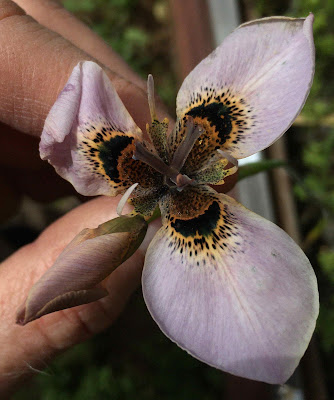Seed parent: MM 13-12b (((M. atropunctata? x neopavonia) x gigandra) X calcicola)
Pollen parent: Moraea neopavonia Summerfield form
I'm not sure what I was hoping to get from this cross; it may have been just a random experiment. But the result looks very like many other crosses I've done with the Summerfield form of M. neopavonia: pale peach flower, dark eye, wide inner tepals.
Saturday, July 25, 2020
Moraea MM 17-37
Seed parent: MM 12-139a (M. 'Zoe' X atropunctata)
Pollen parent: MM 13-84c (loubseri x ((atropunctata? x neopavonia) X (atropunctata x calcicola)) )
MM 17-37a. I crossed an orangey loubseri hybrid with a heavily spotted hybrid, hoping for an orange flower with spots. Instead I got violet with no spots. The yellow center is kind of nice, though.
Moraea MM 17-38
Seed parent: MM 13-85a (M. atropunctata x neopavonia) X loubseri
MM 17-38a. I'm not sure why I singled out this one for a letter.
Here are some others without letters. I'm very intrigued by this first one. The color is bright, the central cup has some of loubseri's intense hairiness but is a much lighter color, and there's a subtle wash of purple on top of the orange that looks pretty interesting.
Pollen parent: MM 13-84c (atropunctata? x neopavonia) X (atropunctata x calcicola)
This cross combined two hybrids that resemble M. loubseri physically but have burnt orange shades blended with loubseri's purple. I wondered what would happen when I brought them together.
The results were pretty diverse. Let's start with a couple of group photos...
Moraea MM 17-36
Seed parent: MM 12-144a (M. gigandra X neopavonia)
MM 17-36b
MM 17-36b(2). I will probably revise the tag to "form C" when I get the chance. Whatever the name, it's an interesting flower.
These don't have letters, but they show you the diversity of pastel colors from this cross. I like the pale ring around the eye in this one:
This one has a very distinctive yellow blaze around the eye.
Pollen parent: MM 11-35c ((atropunctata x neopavonia) x villosa) X (atropunctata x neopavonia)
The seed parent has some brightly colored flowers that blend orange and purple, while the pollen parent is a blended pastel shade of purple-orange. I'm sure I was expecting a range of blended colors in their offspring, hopefully some of them brightly colored. Instead I got mostly pastels, but some of them have interesting dot patterns around the eyes. I don't know where the dots came from; they were not present in either of the parents.
MM 17-36a. This one would be especially interesting if the eye were blue or green instead of black.
MM 17-36d
MM 17-36e
Sunday, July 19, 2020
Moraea MM 17-35
Seed parent: MM 13-139a (M. bellendenii X (gigandra x (atropunctata x neopavonia)) )
Pollen parent: MM 12-109a (tripetala small purple form X neopavonia with blue eye)
This cross combines a strangely-marked orange flower with a peachy-orange hybrid. I was disappointed that I didn't get more color variations, but I am intrigued by the concentric rings of color in this one:
MM 17-35a
Note how the tips of the inner tepals swirl around in a counterclockwise direction:
These individuals haven't been assigned letters:
Pollen parent: MM 12-109a (tripetala small purple form X neopavonia with blue eye)
This cross combines a strangely-marked orange flower with a peachy-orange hybrid. I was disappointed that I didn't get more color variations, but I am intrigued by the concentric rings of color in this one:
MM 17-35a
Note how the tips of the inner tepals swirl around in a counterclockwise direction:
MM 17-35b
These individuals haven't been assigned letters:
Moraea MM 17-34
Seed parent: MM 13-137 (M. tripetala X calcicola)
Pollen parent: MM 14-139 (M. neopavonia with blue eye X M. neopavonia 'Summerfield')
M. tripetala has a history of creating streaks on the tepals of some hybrids. I wanted to see what it would do when mixed with a very orange flower.
As often happens when I cross with M. neopavonia, I ended up with peachy-orange flowers that look a lot like M. neopavonia. And no stripes at all.
MM 17-34a
I didn't assign a letter to this one.
Pollen parent: MM 14-139 (M. neopavonia with blue eye X M. neopavonia 'Summerfield')
M. tripetala has a history of creating streaks on the tepals of some hybrids. I wanted to see what it would do when mixed with a very orange flower.
As often happens when I cross with M. neopavonia, I ended up with peachy-orange flowers that look a lot like M. neopavonia. And no stripes at all.
MM 17-34a
I didn't assign a letter to this one.
Saturday, July 18, 2020
Moraea MM 17-33
Seed parent: MM 13-125 (M. aristata x villosa) X bellendenii
Pollen parent: MM 13-171b (tripetala X villosa)
MM 17-33a. At first I thought these were two different plants, but now that I study the photos more, I think maybe they are a single clone under different lighting conditions (and different white balance settings on the camera). Anyway, the shredded dark eye is kind of cool, but otherwise this flower looks a lot like its seed parent.
Pollen parent: MM 13-171b (tripetala X villosa)
MM 17-33a. At first I thought these were two different plants, but now that I study the photos more, I think maybe they are a single clone under different lighting conditions (and different white balance settings on the camera). Anyway, the shredded dark eye is kind of cool, but otherwise this flower looks a lot like its seed parent.
Subscribe to:
Posts (Atom)







































